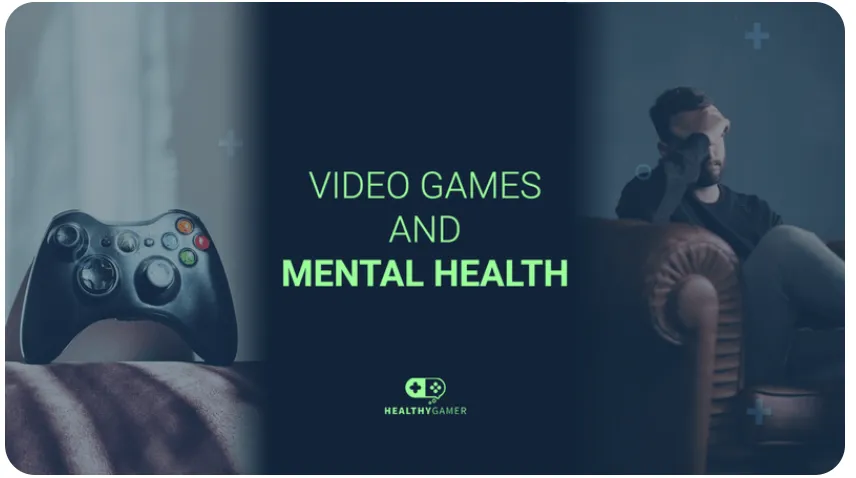In the last few years, the gaming world has seen massive growth in terms of the number of gamers & the assortment of gaming platforms and genres. While gaming can be an enjoyable & immersive hobby, questions have arisen regarding its likely influence on mental well-being. This particle item explores the relationship between gaming and mental health, shedding light on both the positive and negative properties it can have.
The Better Side of Gaming
- Stress Relief: According to PIA, gaming can lower the risk of depression and anxiety and reduce other mental health issues. Winning in games can boost self-confidence and improve mental resilience. Engaging in a captivating game allows players to escape daily life’s pressures, providing a temporary mental break.
- Social Connection: Multiplayer & online games enable social interaction. They let individuals connect with friends and make new ones, helping fight feelings of loneliness and isolation.
- Cognitive Benefits: Many games need tactical thinking, problem-solving, and quick decision-making. These mental exercises can improve perceptive function and improve skills useful in daily life.
- Boosted Confidence: Completing challenging gaming tasks or achieving milestones can boost self-esteem and confidence. This sense of accomplishment can translate into improved mental well-being.
- Distraction from Pain: For those dealing with chronic pain or illness, gaming can serve as a welcomed distraction, helping individuals manage their discomfort and improve their overall quality of life.
Dark Side
- Addiction: Extreme playing of video games can lead to addiction, characterized by an uncontrollable urge to play, neglect of responsibilities, and social removal. Gaming addiction can have severe consequences on mental health, leading to anxiety, depression, and even substance abuse.
- Sleep Disturbances: Intense gaming sessions late into the night can disrupt sleep patterns, causing sleep deprivation and adversely affecting mental health. The absence of sleep can lead to temper swings, prickliness, and reduced cerebral function.
- Isolation: While gaming can foster social connections, it can also lead to isolation when taken to extremes. Excessive gaming can lead individuals to withdraw from real-world interactions, leading to feelings of loneliness and depression.
- Negative Emotions: Competitive gaming can evoke strong emotions, such as frustration, anger, stress, and anxiety. Prolonged exposure to these emotions can take a toll on mental health and even lead to aggression in extreme cases.
- Impaired Academic or Professional Performance: Prioritizing gaming over academic or professional tasks can lead to poor presentation, increased stress, and feelings of inadequacy, ultimately affecting mental health negatively.
Finding Balance
The influence of playing video games on psychological health largely rests on the individual, the amount of time spent gaming, and the types of games played. Striking a good balance between gaming & other aspects of life is important for upholding good intellectual well-being. Here are some tips for finding that balance:
- Set Limits: Establish clear time limits for gaming to ensure it doesn’t dominate your life.
- Prioritize Real-Life Connections: Make an effort to maintain and nurture real-life relationships with family and friends.
- Monitor Your Emotions: Be mindful of your emotional responses to gaming. If you find yourself experiencing negative emotions, consider taking a break.
- Maintain a Healthy Lifestyle: Ensure you get enough sleep, eat well, and exercise regularly to support your overall mental health. Try to optimize your gaming space for your mental health.
- Seek Professional Help: If you suspect gaming is negatively impacting your mental health or becoming addictive, don’t hesitate to seek help from a mental health professional.
Conclusion
Gaming can positively and negatively affect mental health, and the key lies in moderation and balance. When approached mindfully, gaming can provide relaxation, cognitive benefits, and social connections. However, when taken to extremes, it can lead to addiction, social isolation, and a range of negative emotions. Ultimately, it’s essential to strike a healthy balance between gaming and other aspects of life to ensure your mental health remains positive.
F.A.Q.s
1. Is gaming habit a real concern, and how can I tell if I’m addicted?
– Answer: Yes, gaming addiction is a real concern. Signs of addiction may include neglecting responsibilities, losing time while gaming, withdrawal symptoms when not playing, and prioritizing gaming over other important aspects of life. If you suspect addiction, seek professional help.
2. Can gaming improve reasoning skills, or is it just a form of entertainment?
– Answer: Yes, gaming can improve cognitive skills. Many games require problem-solving, critical thinking, and quick decision-making, which can enhance skills such as memory, spatial awareness, and strategic planning.
3. Are certain types of games better for mental health than others?
– Answer: The impact of games on mental health can vary. Puzzle games and those that encourage creativity and exploration tend to have more positive effects. However, competitive and violent games may evoke negative emotions in some individuals.
4. Is playing games an okay stress relief method, or are there better alternatives?
– Answer: Gaming can be a legitimate stress relief method, but using it in moderation is essential. Other stress-relief techniques like exercise, mindfulness, and engaging in hobbies can also be effective and should be considered as alternatives or complements to gaming.

